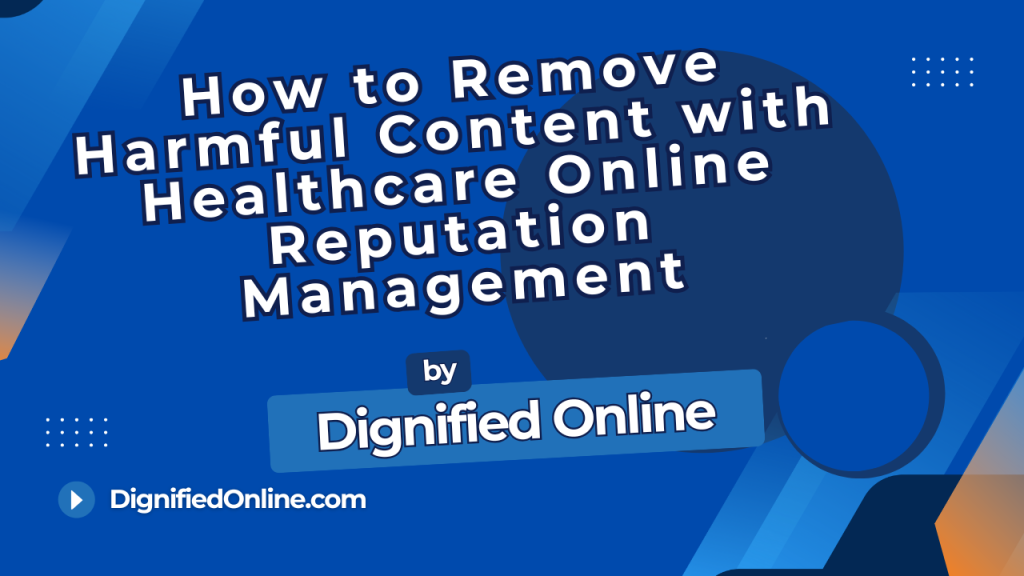In today’s digital world, your online reputation can make or break your professional image. Whether you’re a healthcare professional, clinic, or hospital, a strong online presence is crucial for building trust and credibility with your patients. However, negative search results, outdated articles, and false claims can quickly tarnish that reputation. This is where healthcare online reputation management comes in.
Dignified Online, a leading online reputation management firm, is dedicated to helping healthcare professionals like you identify and remove harmful content that threatens your professional standing. This guide explores how to recognize harmful content online and the best practices for effectively addressing it.
Understanding the Impact of Harmful Content
Harmful content can take many forms:
- Negative Reviews – A few disgruntled patients can leave reviews that don’t reflect the overall quality of your services, potentially discouraging prospective patients.
- Outdated Articles – Information that was once accurate but is now irrelevant or misleading can continue to circulate, confusing potential patients.
- False Claims – False accusations or rumors can spread like wildfire, seriously damaging your credibility and reputation.
For healthcare professionals, these negative search results can be especially damaging. Patients rely on online reviews, articles, and content to make informed decisions about their healthcare providers. Inaccurate or harmful information can not only affect your reputation but also your bottom line.
Identifying Harmful Content
Before you can take action, it’s essential to identify which content is harmful to your reputation. The first step is to regularly monitor your online presence. Dignified Online offers reputation monitoring services that can help you track mentions of your name, practice, or organization across a variety of platforms, including review sites, social media, and news outlets.
Look for:
- Negative Reviews – Keep an eye on websites like Google My Business, Yelp, Healthgrades, and other review platforms where patients may leave feedback.
- Negative Articles – Use search engines to look up your name or business regularly to identify outdated or misleading articles.
- False Claims or Defamation – If you see any rumors or false information, take note of where they are coming from and how damaging they may be.
Approaches for Removing or Suppressing Harmful Content
Once you’ve identified the harmful content affecting your reputation, the next step is to address it. Here are some effective strategies to remove or suppress negative content:
1. Contacting Website Owners and Content Creators
In some cases, negative reviews or outdated articles can be removed or corrected by directly contacting the website owner or the content creator. If a review is factually inaccurate or a news article contains misinformation, reaching out to request a correction or removal can be an effective solution.
Dignified Online has extensive experience working with website owners and content creators to have harmful content removed or updated. Their professional team can handle the entire process, ensuring that your request is taken seriously.
2. Responding to Negative Reviews Professionally
While you might not be able to remove negative reviews entirely, you can take control by responding in a professional and dignified manner. A thoughtful response to a negative review shows prospective patients that you care about patient satisfaction and are committed to providing excellent service.
Dignified Online advises healthcare professionals on how to craft responses that help neutralize the impact of negative reviews without escalating the situation.
3. Content Suppression and Search Engine Optimization (SEO)
One of the most powerful strategies for managing online reputation is content suppression. This involves creating and promoting positive content that pushes harmful content lower in search engine results.
Dignified Online specializes in content suppression by creating high-quality, positive content about your practice or healthcare services. Through strategic SEO practices, they help ensure that positive reviews, articles, blog posts, and other content rank higher than any negative or outdated information.
4. Legal Action for Defamation
If harmful content crosses the line into defamation, legal action may be necessary. False claims that damage your reputation, especially those that are malicious, may warrant a lawsuit. Dignified Online works with legal professionals who can guide you through the process of taking action against defamatory content.
5. Proactive Reputation Management
The best way to protect your reputation from harmful content is to stay ahead of it. Dignified Online helps healthcare professionals with proactive online reputation management, including continuous monitoring, content creation, and review management. By regularly updating your online presence with positive content and addressing any issues immediately, you can mitigate the risk of harmful content impacting your reputation.
Conclusion
In healthcare, reputation matters more than ever. Harmful content, whether it’s negative reviews, outdated articles, or false claims, can have a significant impact on your ability to attract and retain patients. Fortunately, healthcare online reputation management provides effective strategies to identify and address harmful content.
By working with a trusted online reputation management firm like Dignified Online, healthcare professionals can take control of their digital presence, protect their reputation, and ensure that prospective patients see the best side of their practice. Whether through content removal, suppression, or proactive management, Dignified Online offers the tools and expertise you need to maintain a positive online image.
Don’t let harmful content affect your healthcare practice. Take action today and safeguard your reputation for the future.

